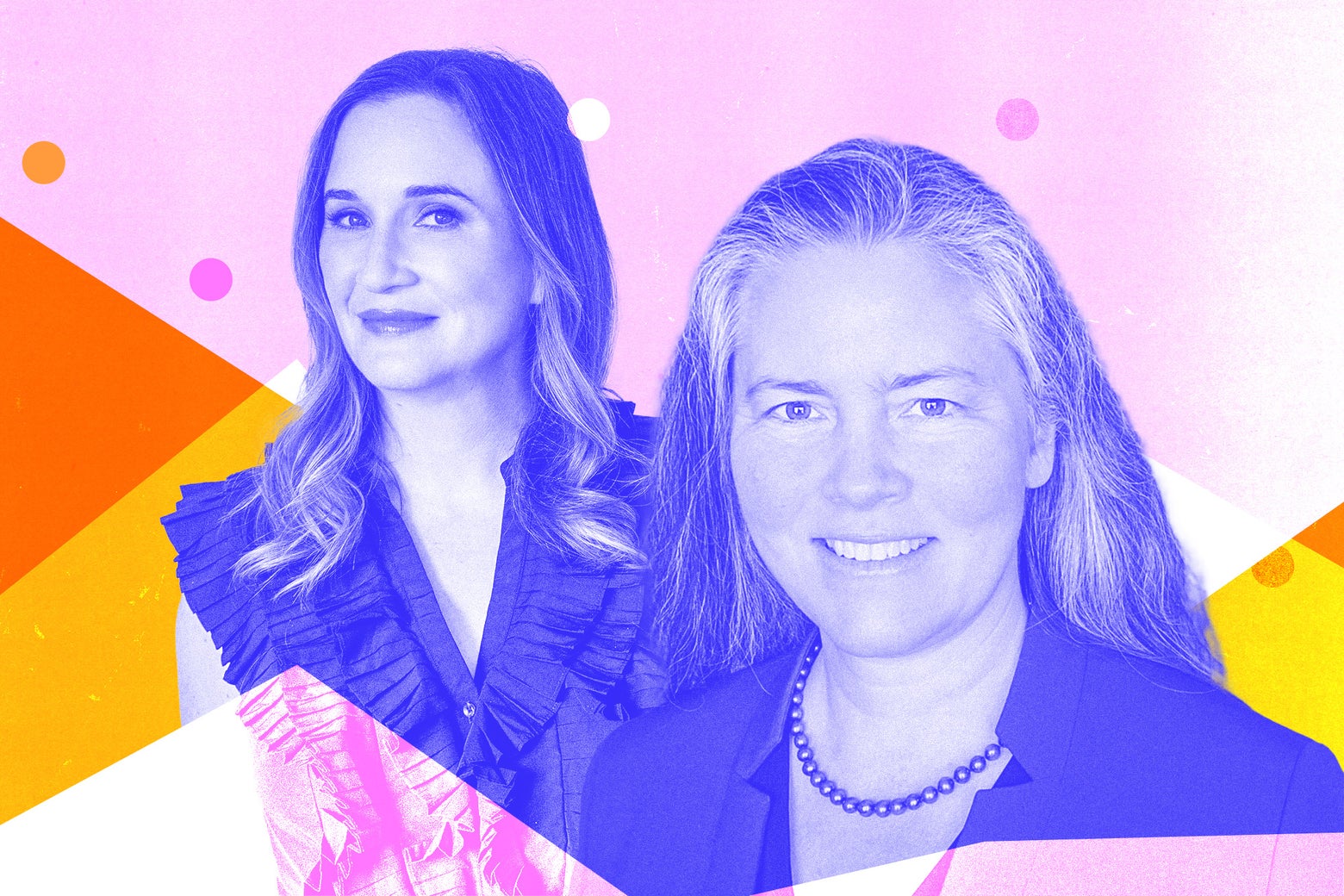Today Slate is introducing Good Job, an advice column about the problems big and small we face in the modern workplace. Written by pioneering online journalist Doree Shafrir, who co-hosts the podcast Forever35 and wrote the workplace novel Startup, and Laura Helmuth, a longtime science journalist and newsroom leader who was previously the editor in chief at Scientific American and a beloved editor and mentor at Slate, Good Job will go beyond the usual trappings of workplace advice and straight into the thornier conflicts that we face every day. From a deskmate who chews too loudly to a manager who is constantly asking for participation in after-hours team-building exercises, Good Job will dig into emotions, interpersonal relationships, and the reasons why spending so many of our waking hours at the workplace can be maddening, confounding, and sometimes more fun than anyone wants to admit.
Good Job will publish twice a week, starting today, with special bonus editions available for Slate Plus members. The column joins Slate’s four major advice franchises: Dear Prudence, the column that started it all; Care and Feeding, for parenting and family advice; How to Do It, for sex and relationship advice; and Pay Dirt, for advice on all things money.
The first column is available to read now, with Laura Helmuth responding to readers’ questions about how to remain positive as a federal employee amid this administration’s sweeping overhaul, how to confront a co-worker whose chattiness derails meetings, and how to deal with a colleague who wears uncomfortably revealing attire.
To get you acquainted with our new columnists, we asked Doree and Laura some questions about their own workplace experiences, the workplace advice that everyone should get, the fictional office they’d most like to work at, and more. Enjoy!
Doree! Laura! We’re so thrilled you’re at the helm of Slate’s new advice column, which is about the modern workplace. What do you hope makes Good Job different from other career and work advice columns out there?
Doree Shafrir: I’m hopeful that Good Job will feel like the wise, comforting big sister of work advice columns—the one you turn to when you need to hear from someone who won’t judge you and will actually offer helpful, thoughtful advice. I hope that even if the advice isn’t exactly what you want to hear, you read it and feel relieved that someone has offered an answer you can trust.
Laura Helmuth: Everybody’s got work problems, and they can feel incredibly isolating and discouraging. Talking through them in this space, we hope, will help the letter writers and the audience realize they’re not alone and they’re not powerless. We want to provide creative, entertaining, empathetic, actionable advice that isn’t what you’d find in an employee handbook or mandatory training sessions. We want to help people succeed at work without having their humanity sucked dry by their workplace culture. And we want to have fun.
What lessons have you learned throughout your own career that you want to incorporate into the column? Or, to put it differently, how have your work histories shaped your approach to the column?
Shafrir: I’d like to think I’ve run the gamut of work experiences. I’ve been an intern, I’ve been an assistant, I’ve been a manager. I’ve hired and fired people and been hired and fired (well, laid off) myself. I’ve worked in offices and I’ve worked from home. I’ve loved my job, hated my job, and everything in between. I’ve made some of my best friends at work and also met people I’d be happy to never have to see again. I’ve learned that there’s almost always two sides to every story, managers often do more than you think they do, salary transparency is really important, and getting involved romantically with someone at work is so, so fraught and tricky, but people are going to do it anyway.
Helmuth: I’ve been an editor for most of my career, so essentially I help people figure out how to say what they mean in a way that an audience will understand and appreciate. Some work ordeals can be eased with better communication, and Doree and I are skilled at that. I’ve been a manager and led big teams; I’ve served on advisory boards; I’ve had great bosses and terrible ones; I’ve mentored lots of people; I’ve made plenty of mistakes. These experiences have helped me help people understand conflicts from multiple points of view, advance their careers, and get unstuck from sticky problems.
What’s the one thing you wish everyone knew about modern-day work?
Shafrir: Your job is not your family.
Helmuth: You have more power than you may think. And we want to help you exercise it (for good).
I know we just launched the column today, but what kinds of questions do you anticipate getting a lot of? Are you excited to answer any particular type of question? Nervous about certain questions?
Shafrir: Probably more than half the questions that people submit to advice columns are, essentially: How do I have this difficult conversation? and/or Am I the asshole? It’s just the specific circumstances and context that change. I do love getting into meaty interpersonal dilemmas. I always try to rewrite the question from the other person’s point of view. Is there some nuance I’m missing, or is there another perspective that’s worth bringing to bear on my response? With workplace questions, you have the added layer of there being actual laws that employers have to follow, which is a tad nerve-racking because you want to get it right! I anticipate that I will be consulting with employment lawyers and human resources experts rather frequently.
Helmuth: Bullying and bigotry are ascendant right now, and that seeps into workplace environments. I suspect we’ll hear from a lot of people whose newly emboldened bosses or co-workers are gleefully discriminating, harassing, and cheating. I am nervous about these questions because the stakes are so high, but excited to answer them because the stakes are so high. I want to help people build solidarity, support equity and justice in their workplaces, and protect their careers from the most powerful villains on the planet.
What are your favorite advice columns to read (other than the many Slate advice columns, of course)?
Shafrir: I’ve been reading advice columns since I was a kid. Ann Landers, Dear Abby, Miss Manners, Carolyn Hax, the Sassy magazine Dear Boy column—I read them all. I always felt as if advice columns were a window into the human condition: The questions provided an intimate glimpse into the struggles in people’s lives, and the responses were reflective of the cultural and socioeconomic context of the advice giver. Besides the Slate columns, I enjoy reading Anna Holmes’ Work Friend column in the New York Times, Emily Gould’s Fix My Life in the Cut, Maddy Court’s Queer Advice column in her newsletter TV Dinner, Aminatou Sow’s Gentle Suggestions (NOT an advice column!), Jessica DeFino’s Ask Ugly in the Guardian, Ask a Manager, and probably a million more I’m forgetting. And of course, I am a regular reader of Am I the Asshole on Reddit, because crowdsourced advice is so fascinating.
Helmuth: I love, love, love advice columns, especially Slate’s. I grew up on Ann Landers and Miss Manners and have learned a lot from Dan Savage’s Savage Love and Carolyn Hax.* Karla Miller and Alison Green give good work advice. One thing I’ve learned from the best advice columns is that the question someone asks should start the discussion but not limit it. Savage’s sex advice is also about liberation and social justice. Hax’s relationship advice is also about agency and empowerment. And the best advice columns build empathy—everybody you meet is struggling with something.
OK, now a couple of fun ones. If you could receive life advice from anyone, dead or alive, who would it be and why?
Shafrir: It’s cliché at this point to say Nora Ephron, but really, Nora Ephron.
Helmuth: Marie Skłodowska Curie made fundamental discoveries in chemistry and physics and mentored a generation of women scientists. She succeeded despite being female and Polish in a French scientific culture that was sexist, xenophobic, and antisemitic. (She wasn’t Jewish, but then, as today, haters assume that any white person they hate is.) She had mutually supportive romantic relationships and raised two daughters, one who became a journalist and the other a scientist. She commiserated with Albert Einstein about trolls. The only problem with naming her as an inspiration for a work advice columnist is that she studied radioactivity before people realized how carcinogenic it is, and she died of cancer. Her work literally killed her.
What fictional office would you most like to work at?
Shafrir: Composure magazine.
Helmuth: The Murderbot Diaries series, by Martha Wells, is narrated by a darkly funny, misanthropic half human–half robot who escapes enslavement by an evil corporation and finds his people (human and non-). The good guys Murderbot chooses to work for come from Preservation, and that’s the best office culture I’ve ever read about. Preservation characters have messy relationships, office politics, and dangerous missions, but they’re clever, egalitarian, courageous, and committed to justice on a galactic scale.
Correction, Feb. 12, 2025: This article originally misstated the name of Hax’s advice column.
















